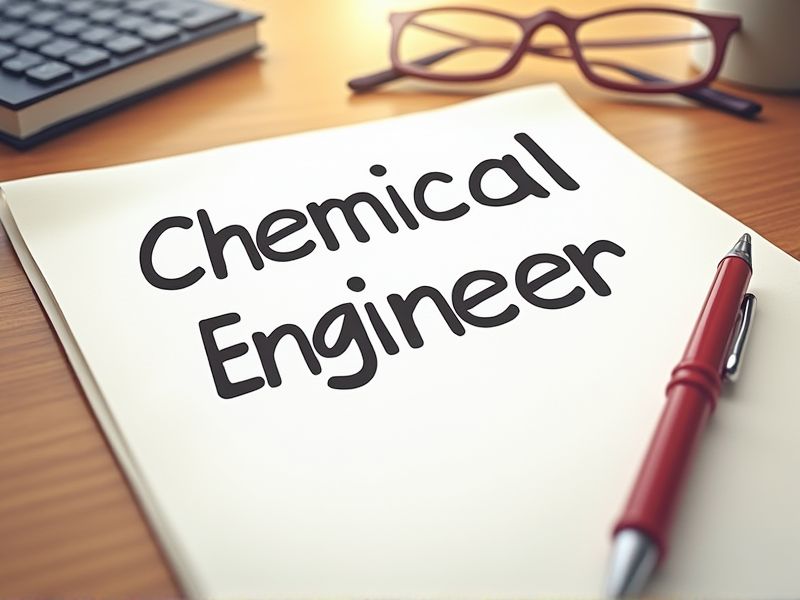
Chemical engineers often work in complex and regulated industries such as pharmaceuticals, energy, and manufacturing, which necessitate specialized knowledge and skills to ensure safety and efficiency. Specific certifications can validate a chemical engineer's expertise in handling hazardous materials, designing safe processes, and adhering to environmental regulations. These credentials also enhance career prospects and professional recognition within the industry. Here are some key certifications that chemical engineers might require.
Professional Engineer (PE) License
Obtaining a Professional Engineer (PE) license is crucial for chemical engineers because it certifies their expertise and validates their technical knowledge in the field, which enhances their credibility. The PE license is often a prerequisite for senior positions and leadership roles, as it ensures compliance with safety and industry standards in engineering projects. It is critical for executing the design, operation, and management of processes that require adherence to governmental regulations, particularly in the chemical industry. The license also expands career opportunities and potentially leads to higher earning potential within the engineering sector.
Certified Process Safety Professional (CPSP)
The CPSP certification provides chemical engineers with specialized knowledge critical for minimizing risks in the chemical industry. This credential ensures engineers are equipped to implement safety protocols that prevent accidents and protect both workers and the environment. Holding a CPSP can enhance career opportunities, as it demonstrates a commitment to maintaining high safety standards. By obtaining the CPSP, chemical engineers contribute to optimizing operational efficiency while ensuring regulatory compliance.
Certified Safety Professional (CSP)
The Certified Safety Professional (CSP) credential provides chemical engineers with authoritative recognition of their expertise in safety, which enhances their professional credibility and career opportunities. Compliance with regulations becomes more manageable as CSP holders are well-versed in current safety standards and practices, reducing the risk of workplace incidents. Companies often seek CSP-certified professionals to ensure safer operational environments, thereby minimizing the potential for costly accidents and legal repercussions. Chemical engineers with CSP credentials are equipped to develop more effective safety protocols, promoting a culture of safety and efficiency within organizations.
Six Sigma Green Belt Certification
Obtaining a Six Sigma Green Belt Certification enhances a chemical engineer's problem-solving skills, leading to improved process efficiency in manufacturing settings. Chemical engineers with this certification can effectively reduce waste and variation, resulting in cost savings and higher product quality. The ability to apply Six Sigma methodologies enables these professionals to lead teams in streamlining operations and implementing quality control measures. This certification distinguishes chemical engineers in the job market, potentially leading to career advancement and increased job opportunities.
Six Sigma Black Belt Certification
Possessing a Six Sigma Black Belt Certification equips chemical engineers with enhanced analytical skills, leading to improved process efficiencies. This certification provides them with a structured problem-solving methodology, crucial for innovative and complex chemical processes. It instills a data-driven mindset, essential for reducing variability and enhancing product quality. Being certified often positions chemical engineers for leadership roles, significantly impacting project success and operational excellence.
Project Management Professional (PMP)
PMP certification equips chemical engineers with standardized project management skills, enhancing their ability to efficiently oversee complex projects. Mastery in project management facilitates better resource allocation, crucial in managing time-sensitive chemical processes. Effective communication ensured by PMP reduces misunderstandings, crucial when coordinating cross-disciplinary teams. Proficiency in risk management through PMP training minimizes potential hazards in chemical engineering projects.
Certified Quality Engineer (CQE)
Certified Quality Engineers are crucial for chemical engineers because they ensure the processes meet regulatory standards and quality benchmarks, minimizing risks associated with chemical production. Poor quality control can lead to product failures and safety hazards, so having CQE expertise can prevent these issues. CQEs bring methodologies for continuous improvement, enhancing efficiency and cost-effectiveness in chemical processes. They contribute to strategic decision-making by analyzing quality data, thereby mitigating potential operational disruptions.
Lean Six Sigma Certification
Lean Six Sigma Certification equips chemical engineers with tools to enhance process efficiency by systematically reducing waste, leading to cost reduction. Proficiency in these methodologies allows for better quality control, minimizing defects in chemical production and ensuring higher product standards. Chemical engineers with Lean Six Sigma skills are more competitive in the job market due to their ability to drive improvements that impact both productivity and profitability. The certification enables engineers to implement data-driven decision-making processes, optimizing chemical reactions and scaling up industrial operations effectively.
Certified Hazardous Materials Manager (CHMM)
Chemical engineers often work with hazardous materials, which require expertise in regulatory compliance. Possessing a CHMM certification signifies proficiency in managing such materials safely and legally. Employers see CHMM as a standard for risk management, thereby enhancing job opportunities. With this certification, engineers contribute to safer workplace environments by minimizing chemical exposure risks.
Certified Energy Manager (CEM)
Chemical engineers equipped with a Certified Energy Manager (CEM) credential can optimize energy usage in chemical processes, leading to significant cost savings. This specialization enhances their ability to design more energy-efficient systems, reducing environmental impact. Energy management skills gained through CEM certification allow chemical engineers to comply with stringent regulations and standards. Possessing a CEM certification increases a chemical engineer's competitiveness for leadership roles in sustainability-driven industries.
Summary
By obtaining certifications, you can enhance your credibility and professional standing in the field of chemical engineering. This recognition often leads to increased job opportunities and potential for higher salaries. Additionally, certifications can equip you with updated knowledge and industry-specific skills. Such credentials may also give you a competitive edge in leadership roles and innovative projects.
